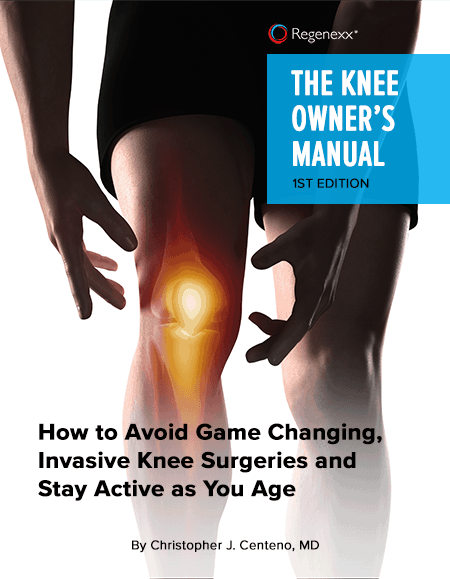CONTACT US. 509.588.7340
We understand how it feels to be frustrated by knee pain.
You may feel frustrated, anxious, and afraid. Feeling like you might not get to participate in activities you’ve always enjoyed, fearful that you might need surgery that could affect you for the rest of your life.

Are you frustrated by pain? Afraid you might need life-altering surgery?
You’re not alone. We can help.
Complete this short form and get your FREE copy of The Knee Owner’s Manual, plus receive valuable information that can help you avoid invasive surgery.
Partial knee menisectomy is a very common surgery that involves removing the torn part of the meniscus. The meniscus is a natural shock absorber for the knee. In fact, in America alone, we perform about 700,000 of these surgeries per year, making it one of the most common orthopedic surgeries. While most patients think they’re getting a meniscus repair procedure, the truth is, 96% of these surgeries just remove a piece of the shock absorber, leaving your knee less protected.
There have been many high-quality research studies over the past decade or more that were designed to answer the specific question, “Is surgery necessary for a torn meniscus?” What did they show? All three large studies showed that meniscus surgery was not effective or no better than just physical therapy.
We offer innovative non-surgical procedures that may help decrease pain and improve knee function and mobility without the need for surgery.
Meniscus surgery is traumatic and carries associated risks. Even successful surgeries require months of painful rehab to regain strength and mobility. After surgery, most patients will be on crutches, wear a brace, or some combination of both for several weeks before returning back to normal activity. The recovery time and rehabilitation period may be extended up to six weeks with a knee brace or crutches.
Keep in mind that there may even be some complications associated with meniscus surgery, prolonging the recovery period even more. This includes complications with anesthesia, such as respiratory or cardiac malfunction, infections, and injury to nerves and blood vessels, fracture, weakness, stiffness or instability of the joint, inability to repair the meniscus, repeated rupture of the meniscus, or the need for additional surgeries.
Can you ever truly recover from parts of your knee meniscus being removed surgically? In the long run, almost all meniscus surgeries accelerate degeneration that leads to osteoarthritis and exacerbate the biomechanical problems that initially led to the need for the surgery.
Meniscus tears are like wrinkles; they are unavoidable. Some of us get more of them at a young age and some of us don’t get a lot of them until we’re older. The meniscus gets small tears as we age and as the knee joint begins to wear out. For example, in middle-aged and elderly patients, taking an MRI of patients with no knee pain and those with ongoing knee pain will reveal that both groups have about the same amount of meniscus tears. If these things usually don’t cause pain, why are we operating on them? If our surgeries are no better than fake surgeries, why are we placing all of these patients at the risk of surgical complications?
Recent research shows that some of the most popular orthopedic knee surgeries, including meniscectomies, have no benefit and are not more effective than placebo or sham surgery. But can a meniscus tear heal on its own when left untreated? Non-surgical treatments for meniscus tears for healing on their own include physical therapy, rest, ice, compression and elevation. Interventional orthopedics also provides a non-surgical injection alternative that may prove beneficial in reducing pain and improving function.
Have you been told that invasive surgery is your only option to fix your torn ACL? Getting your ACL replaced permanently alters the mechanics of the knee joint. You have other options when it comes to treating your ACL injury. In fact, about 70% of all ACL tears that currently get surgery could have been treated with a precise injection.
Your body is built to repair itself and our goal is to save your ACL, not replace it. We offer a non-surgical alternative for ACL tears that requires advanced injection skills using X-ray guidance, which may aide the healing of your ACL tear, while reducing pain and increasing function.
Multiple studies show that meniscus surgery doesn’t work.
If your MRI shows a meniscus tear, you might be asking: Do I need surgery?
But here’s the more important question: Is the torn meniscus causing my knee pain?

Northwest Center for Regenerative Medicine Doctors
As a board-certified physician in both physical medicine and rehabilitation with a subspecialty in pain medicine, Dr. Lewis treats patients throughout eastern Washington and northern Idaho. He treats spine conditions, full-body joint pains and complaints, muscular issues, and complex regional pain.
Dr. Lewis is the medical director of the Center for Integrative Pain Medicine, the Center for Regenerative Medicine, and the Structured Intensive Multidisciplinary Pain Program at St. Luke’s Rehabilitation Institute in Spokane, Washington.
Areas treated: Cervical Spine (Not Upper Cervical or CCI)*, Hip, Knee, Lumbar Spine, Shoulder, Thoracic Spine, Foot & Ankle, Elbow, Hand & Wrist
Dr. Nemri’s extensive experience has brought many patients the expertise of a compassionate and caring physician.
He practiced anesthesia and pain management for several years in the largest pain management group in northwest Indiana and the greater Chicago area before moving to Washington State to be closer to his family.
Areas treated: Cervical Spine (Not Upper Cervical or CCI)*, Lumbar Spine, Thoracic Spine
Clinic Locations
Coeur d'Alene
509 West Hanley Avenue
Coeur d'Alene, ID 83815
509.588.7340
Spokane
3124 S. Regal Street
Spokane, WA 99223
509.588.7340
Vancouver
9430 Northeast Vancouver Mall Drive
Vancouver, WA 98662
509.588.7340
*DISCLAIMER: Like all medical procedures, Regenexx® Procedures have a success and failure rate. Patient reviews and testimonials on this site should not be interpreted as a statement on the effectiveness of our treatments for anyone else.
Providers listed on the Regenexx website are for informational purposes only and are not a recommendation from Regenexx for a specific provider or a guarantee of the outcome of any treatment you receive.




